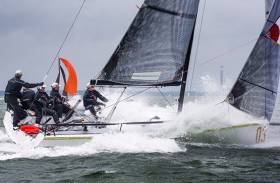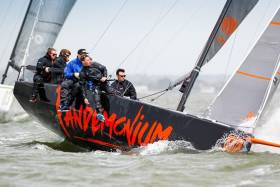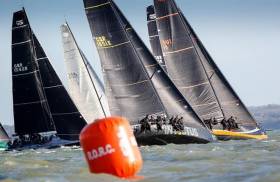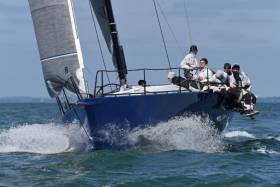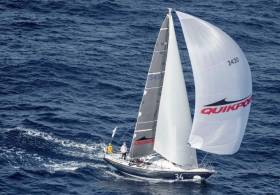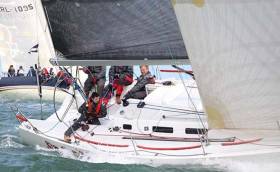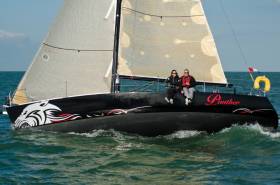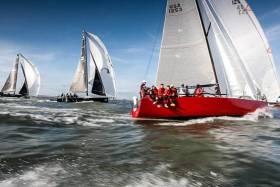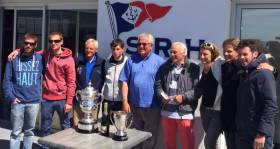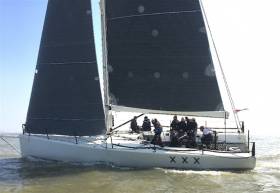Displaying items by tag: RORC
The third and final day of the Vice Admiral's Cup organised by the Royal Ocean Racing Club produced a dramatic finale in two classes. A light northerly breeze succumbed to a solid southwersterly air flow which built during the afternoon, as did the tension, especially in the 10-strong Fast40+ Class and the 12-strong Quarter Tonner Class. Race Officers, Stuart Childereley and Rob Lamb organised two races for their respective fleets, completing the eight race series for all six classes.
Fast40+ Class
Bill Coates' Texan Ker 43, Otra Vez was kicking himself after racing today, having been called back in both races for crossing the line too early. “I told you if you make a mistake, this fleet punishes you and they did, two 'over earlies' today meant we threw away the class win but this has been fantastic racing and we will be back for more.” Peter Morton's British Carkeek40 Girls On Film scored a win and a second place to snatch the title on the last race. Mike Bartholomew's South African GP42, Tokoloshe was third by less than a point.
“This event has been going since 2005 and it is great to see it is in good shape and in good hands.” commented Peter Morton, who was one of the founders of the event. “My congratulations to all of the winning teams and also to the Race Officers and their teams who did a fantastic job. The Fast40+ class is some of the best racing we have had in the Solent for years and we hope that it is going to get bigger and better.
HP30 Class
Thorkild Juncker's Danish, Open 7.50 Cool Runnings revelled in the conditions today to win both races by a healthy margin but Lloyd Thornburg's Farr 280, FOMO scored two second places to win the class by three points; Malcolm Wooton's Farr 30, Pegasus was third.
“That is the first time I have got in a machine like that since my college days” smiled Lloyd Thornburg. “It was great , very challenging but surprisingly fun and very powered up. She goes off the wind. This is something of a laugh and primarily to race in Cowes Week but I have to say we have done more starts this weekend then I have done with the MOD70 all year.”
SB20 Class
In the SB20 Class, Forelle Estates, helmed by Joe Llewellyn kept up their perfect score line with two more bullets to win the class with a perfect score. Charles Sheppard racing Sharc and McAdam & Whelan racing Here come Bod, had a tremendous battle for second place, which was won by Charlie Sheppard.
J/111 Class
The intense competition in the J/111 Class continued right until the last race with virtually every one of the eight race series being decided by seconds. Overnight leader Stuart Sawyer's Black Dog could only manage a sixth place in the last race but just hung on to win the class on countback from Cornel Riklin's Jitterbug. The young team on Martin Dent's JElvis scored a second place in the last race to come third in class, just a point ahead of Tony Mack's McFly.
“Fantastic, close racing, which is just what we need” smiled Stuart Sawyer. “This is a big year for the J/111 UK fleet, we have the J-Cup, The National and the World Championships to look forward to and the Vice Admiral's Cup has been a great event to start our season and we have done better than I expected.”
J/109 Class
Robert Stiles' Diamond Jem had another great day, posting two wins to win the class by a big margin. David Richards' Jumping Jellyfish was second and Simon Perry's Jiraffe finished the regatta in third place.
Quarter Tonner Class
Sam Laidlaw's Aguila retained their class win from last year. In a highly completive class, Aguila won the very last race to take the series by a half point. Aguila designed by Ralph Vrolick in 1990 was helmed by Sam Laidlaw; all of his crew, from the Isle of Wight, were not born when the boat was built. Louise Morton's Bullit had led the regatta from the first day and agonisingly lost the title by just half a point.
“Very tough close racing” summed up Sam Laidlaw. “ I felt that we were capable of beating them in both races but if it hadn't been for Magnum Evolution getting between us, we would have lost by half a point, so we were very fortunate in that respect. This fleet produces really close racing, which is also good fun and bodes well for the Quarter Ton Cup.”
RORC Commodore, Michael Boyd officiated at the Prize Giving at the Royal Ocean Racing Club's Cowes Clubhouse. He thanked all of the competitors for coming and showed appreciation for the RORC Race Team, especially the number of volunteers who give up their free time. Racing with the Royal Ocean Racing Club continues with the Myth of Malham offshore race, on Saturday 28 May.
RORC's Vice Admiral's Cup Has High Performance Fleet
The Royal Ocean Racing Club's Vice Admiral's Cup burst into action on the first day of racing. With 15-20 knots of wind and a building tide, the high performance fleet was launched on two tight windward leeward courses and a final round the buoys race to finish off a thrilling day on the water. With downwind boat speed nudging over 20 knots at times, staying on the plane and nailing gybes at full chat was the secret to high gains. Many of yesterday's 18–races between six different classes were won by seconds.
After three thrilling races in the ten-boat Farr40+ Class, Peter Morton's British Carkeek40, Girls on Film scored a 1-3-2 on the first day to lead by three points from Mike Bartholomew's South African GP42, Tokoloshe II. William Coates' Texan Ker 43, Otra Vez scored a 2-1-7 to finish the day in third place. The results of the Fast40+ Class are subject to protest.
“Winning the pin today and getting onto the bank was a favourable option but we decided that we would start a few boats in, so we wouldn't have to tack as long as we could hold our lane, and that worked out okay for us today. On top of getting out of the tide, there were left hand shifts coming off the island which worked well for us. We are quite strong downwind and managed to hold off some good competition in the first race from Otra Vez. Jubilee did a good job downwind in the second race and in the third race we managed to trawl a spinnaker, which set us back. About half the fleet made the podium today and there was a different winner in each race. In this fleet, you make a mistake, or fail to get off the line well, and you will be passed by three or four boats, that's how it should be and what this class is all about.” commented Peter Morton, Girls on Film.
Jamie Rankin's Farr 280 Pandemonium finished the day on top of the leader board for the HP30 Class with three podium finishes including a win in Race 2. Lloyd Thornburg's Farr 280, Fomo scored 4,2,1 to finish the first day in third place, an impressive performance, as the team from Lloyd's MOD 70 Phaedo3, only stepped into racing the boat today. Thorkild Juncker's Open 7.50 Cool Runnings was incredibly fast today, scoring a bullet and a third in the first two races but a broken halyard saw the dutch team fail to start the third race.
“Keeping the sails point at the sky, certainly helped our cause!” Laughed Pandemonium's Jamie Rankin. “The Farr 280 is very wet but super fast downwind and it was great to race with my sister Frankie. I know the colour scheme on the boat isn't exactly subtle but these boats are really enjoyable and today was the first time out in big breeze with a proper fleet. Ploughing through the waves, you really needed swimming goggles and some of the gybe on gybe action was hard work but just immense fun.”
In the SB20 Class, four teams shared the podium but there were three straight bullets for last year's Vice Admiral's Cup winner, Forelle Estates, helmed by Joe Llewellyn. Charles Sheppard's Sharc scored 2,2,3 to finish the day in second place and McAdam & Whelan's Here Comes Bod, finished the first day in third position. Doug Innes' A New Hope scored a third in the last race, securing fourth just a point ahead of Peter Noe's 6a Vision Homes.
Stuart Sawyer's J/111, Black Dog came out of the blocks with good pace, winning the the first two races and placing third in the last, the Cornish team lead the class but the racing was incredibly close. Cornel Riklin's Jitterbug scored three second places to finish the day just a point behind the leader and Tony Mack's McFly finished the day in third place. “We were happy with our speed today, especially downwind but we had a really bad rounding in the last race and let Jelvis get away and allowed Jitterbug to catch us up. In the end there was just 16 seconds between all three of us. The J/111 fleet can be quite aggressive and we have come to have a really competitive regatta and we are pleased with how we are going.”
In the J/109 Class, Robert Stiles' Diamond Jem had an outstanding day, posting two wins and a second, to lead the class by three points. David Richards' Jumping Jellyfish won the last race of the day to take second place in the class, just a point ahead of Chris Copeland's Juke Box.
Louise Morton's Quarter Tonner, Bullit placed third in the first race and went on to win the last two races to lead the Quarter Tonner Class ahead of Sam Laidlaw's Aguilla. Tony Hayward's Blackfun is third.
“We had a really good day today despite the tricky conditions with wind against tide and breaking our pole in the first race was not ideal.” commented Louise Morton. “We did have a couple of wipe-outs but we were not alone, Quarter Tonners can be a handful downwind. Well done to Stuart Childerley and his team for getting six classes off for three good races each, I am sure the race committee was as tired as us by the end of the day.”
Racing at the RORC Vice Admiral's Cup continues Saturday 21 May, with three more races scheduled for all six classes.
Pulsating action is anticipated this weekend for the 12 edition of the Vice Admiral's Cup, organised by the Royal Ocean Racing Club. A full range of weather conditions is forecast for one of the best fleets of racing yachts seen at the event since its conception in 2005. With planing conditions forecast for the entire weekend, there will be a flurry of action on tight Solent courses. Two separate racing areas will be in operation with up to three races per day for the three-day regatta. Eight races are scheduled with the discard rule coming into play when six or more races have been completed.
Top of the bill will be the Fast 40+ Class and this year's event will also feature the first regatta for the HP 30 Class. The Quarter Tonner Class will join the Fast 40+ and HP 30 Class rated under IRC and there are three one-design classes, level rating; J/111, J/109 and SB20 Sportsboats.
Ten yachts are expected for the Fast 40+ Class, including RORC Easter Challenge winner, Texan Bill Coates with Ker 43, Otra Vez. Sir Keith Mills' British Ker 40+ Invictus and Peter Morton's Cowes-based Carkeek 40, Girls On Film, are both racing, and will be looking to take their first regatta victory of the season.
Six pocket rockets are expected to contest the first ever HP 30 Class, including Lloyd Thornburg's FOMO. The RORC Caribbean 600 multihull record holder will be joined by Brian Thompson, along with several MOD70 crew from Phaedo3. Thorkild Juncker's Open 7.50 Cool Runnings will also be racing with 'speed doctor' Jochem Visser as part of the crew.
The J/111 Class looks to be very competitive with proven winners right through the one design fleet. Stuart Sawyer's Cornishmen racing Black Dog are always a potent force and came second last year. 2014 European Champion, Cornel Riklin's Jitterbug will be racing, as will last year's Vice Admiral's Cup winner, Tony Mack's McFly. The J-Boat fleet at the regatta will be complimented by a fleet of J/109s level racing under their class rules.
In the SB20 Class, Joe Llewellyn's Forelle Estates is back to defend their emphatic win last year. 2011 UK SB20 Inland Champions Richard McAdam & Charlie Whelan will offer top competition. 12 Quarter Tonners will be racing including the top four teams from last year. Sam Laidlaw's Aguila will be defending last year's final race win and last year's runner up, Rickard Melander's Alice II, is back. Tony Hayward's Blackfun and Louise Morton's Bullit are both racing, and were third and fourth respectively last year.
Shakti wins RORC's De Guingand Bowl
The 2016 Royal Ocean Racing Club's De Guingand Bowl Race was held in the Solent and South Coast of England in highly changeable conditions. During the course of the race the wind direction swung to every point on the compass and the wind strength varied from zephyrs to 16 knots. Keeping your head out of the boat for the changes and pre-empting and correctly adapting to them was the key to success. RORC racing manager, Nick Elliott, chose a longer course of 123 nautical miles for the faster yachts and a shorter course of 105 nautical miles for the smaller and slower boats, with the overall result being decided on average speed.
Christoph Avenarius & Gorm Gondesen's German Ker 46, Shakti had a fantastic race, taking Line Honours, Class IRC Zero and the overall win for the best corrected time under IRC for the fleet. It is a great start to the season for Shakti. The key regatta for the German team is the RORC IRC National Championship in late June, where Shakti will be competing with about a dozen Fast 40+. Second overall and winner of IRC Three was Arnaud Delamare & Eric Mordret's JPK 10.80 Dream Pearls. Hugo Tardivel's A31 Columbus Circle was third overall and first in IRC 4. However the results in IRC 4 are subject to a pending protest.
In IRC 1, Nick Jones' British First 44.7 Lisa was the winner. Michel Peretie's French prototype Stamina was second with Seb & Michael Blair's King 40 Cobra third. Nick Jones' First 44.7, Lisa leads the class for the season and is second overall for the Season's Points Championship.
"It was an extremely tiring race, a great win and we had a bit of everything." commented Nick. "We did get becalmed a couple of times between The Solent and Owers Buoy, which was frustrating and there were lots of apparent losses and gains during the race; we all had our moments. The big race for Lisa this season is the Round Ireland and although Lisa's co-skipper, RORC Commodore, Michael Boyd was sailing his new boat for this race, we did have six of the crew on board and it was good to jell together. Lisa is a production boat and cannot point anywhere near as high as the race boats but you can manage that. For example in this race, we could see on the AIS that there were boats stuck with no wind under The Needles, so we put in a half mile tack offshore as we passed St.Catherine's Point, so that we could lay past The Needles. We would have been history if we had got stuck there and by having a better angle, we could also foot-off. Lisa is a heavy boat and in light airs, upwind, we tend to sail five to ten degrees off the wind to keep her going."
In IRC 2, Roderick Stuart & Bill Ram's Corby 37, Aurora was the winner. RORC Admiral, Andrew McIrvine racing First 40, La Réponse was second with the Army Sailing Association's J/111, British Soldier in third. Whilst in IRC 3, Arnaud Delamare & Eric Mordret's class win, racing JPK 10.80 Dream Pearls, was enough to put the French team into the class lead for the season. Thomas Kneen's JPK 10.80 Sunrise was second in IRC 3 for the race and James Chalmers' Weymouth team racing J/35 Bengal Tiger was third.
In IRC 4, RORC committee member, Stuart Greenfield racing Silver Shamrock was second to Hugo Tardivel's A31, Columbus Circle, with Noel Racine's JPK 10.10, Foggy Dew third. Robert Nelson's J/105, Bigfoot was fourth in IRC 4, which was enough to put the Two-handed team in first place overall for the RORC Season's Points Championship.
Stuart Greenfield found Silver Shamrock by chance on a trip to Falmouth Cornwall last year and bought the half tonner on the spot. "Silver Shamrock was built for Harold Cudmore by Killian Bushe in Cork and won the 1976 Half Ton Cup. Harold painted her in the colours of his credit card because that's how he paid the builder. After winning the cup the boat disappeared and I found her by luck in Falmouth and sailed her back to Cowes on my own. Silver Shamrock has been refitted and converted to asymmetric sails. My big race of the season is the SORC Round the Rock race this summer, a single handed race to the Fastnet Rock, so over the winter I refitted her to Category 2 standard and took eight coats of anti-fouling off her hull amongst other things."
It was a fantastic feeling to do so well in the De Guingand Bowl Race, when we were becalmed on the first night and the fleet just left us, we never gave up and just kept the boat moving. After coming around the Nab Tower, we must have put in 25 tacks to keep the boat moving. We stayed up all night and managed to get a zephyr and sailed the boat right in under Culver Down, which kept us going. As dawn was breaking, we went right in at St. Catherine's Point to take advantage of the tide, as it turned. We also got into good pressure and according to the tracker we went from a poor ranking position to second in class in those last few hours - never give up."
The Royal Ocean Club's Season's Points Championship continues on Saturday 28th May, over the May Bank Holiday with the Myth of Malham Race. The 256 nautical mile Cowes - Round Eddystone - Cowes course is weighted 1.2 for the championship and a highly competitive fleet is expected to be racing.
RORC Travels 'Down Under' On IRC Quest
James Dadd, Director of the Rating Office in Lymington UK which is the technical hub of the Royal Ocean Racing Club, will be travelling to the other side of the world this month to meet with boat owners and race organisers in New Zealand, Australia and South East Asia and talk about the International IRC rating rule.
IRC is expanding with new territories in India and Taiwan, growth in Japan and China and very encouraging numbers for the start of the year from many Northern European countries but there appears to be an ongoing battle between rival handicap systems ORC and IRC for the hearts and minds of cruiser racer sailors around the world.
For example, RORC reacted strongly to an article following an ORC presentation at the ICRA Conference in Limerick, in March. In a statement at the time, RORC Commodore Michael Boyd said in response to the Irish article he felt 'very strongly' that information put forward by Dobbs Davis, Chairman of ORC’s Promotion and Development Committee, 'needs correcting'.
RORC says IRC Owners’ Forums will be hosted by Yachting New Zealand, Yachting Australia and IRC South-East Asia, giving sailors the chance to join in discussion and question/answer sessions about IRC racing.
James Dadd is looking forward to meeting owners as well as race organisers and measurers during his trip. “I’m keen to meet up again with those involved in IRC racing in the Antipodes and South East Asia which are both important regions to us,” says Dadd. “It will be good to have the opportunity to hear new ideas and address any questions people may have about IRC racing both locally and internationally.”
Next month's ICRA Nationals at Howth Yacht Club will feature what looks like the 'hottest cruiser fleet of the year' when class one boats resume battle after last year's epic clash at Kinsale.
Paul O'Higgins new JPK 10.80 will be up against some good J109's (including John Maybury's Joker which won ICRAs in 2015, Jelly Baby from Cork, Storm from Howth and J/109 newcomer Tim Goodbody). Also in the class one mix will be the A35 Fools Gold which was second to Joker at Kinsale and also won the Scottish series 2015 overall. Former champion, the XP33 Bon Exemple, skippered by Philip Byrne of the Royal Irish, is also a contender.
The cruiser racer body says its decision to apply 'equal status and trophies to IRC and Progressive Echo has attracted support' and overall entries for the championships is now in the sixties. The event is timed to lead into the Round Ireland, WIORA and Cork Week and Calves Week in a summer of racing highlights.
Although an early discount deadline has now passed, organisers have made the decision to extend it, presumably because they see there is still lots of potential entries to still emerge in each division.
Class two should be very competitive as well with four Half Tonners vying against the home club's X332 Equinox (Ross McDonald) plus a few others. Half tonners won't have their pro sailors however as ICRA rules only allow pros in classes 0 and 1.
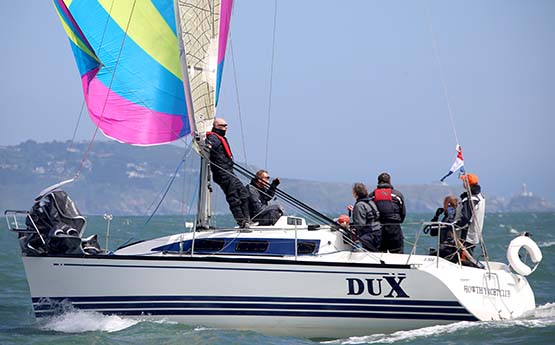
Dux from HYC will compete in class three
Class three will see Fusion the Corby 25 of Colwell, Cobbe and Ronan pushed by likes of Anthony Gore Grimes in Dux, the Sigma 33 s and the ICRA Commodore's family boat from Foynes Yacht Club, the McGibney's Dis a Ray.
The event is under the experienced Chairmanship of Chris Howard who has twice before run championships with ICRA at this County Dublin venue.
The programme will provide seven races over three day from Friday 10th to Sun 12th June with a mix of windward/leeward courses and interesting round the cans courses.
ICRA will be presenting overall matching perpetual trophies for IRC and ECHO in each Division in addition to ISA Gold, Silver and Bronze medals smartly mounted which are unique to the National championships.
ICRA's Corinthian Cups are also competed for in both Progressive Echo and IRC will provide equally interesting courses, specifically designed for the non spinnaker divisions with overall trophies and glass mountings as prizes.
Woozle Hunter Wins RORC's North Sea Race
RORC's North Sea race from Harwich UK across the North Sea to Scheveningen Netherlands, was blessed with summer-like conditions. After a beat to South Galloper Buoy, the fleet turned north for a long starboard tack reach to Smith's Knoll Buoy, followed by a port tach reach to the Netherland's coast and a beat to finish at Scheveningen.
Volvo 70, Sanya Ocean Racing, sailed by Dutchman Harm Prins, took Line Honours in an elapsed time of 22 hours and 57 seconds but the high pressure produced a light airs race that suited the smaller yachts. The overall winner, after IRC time correction, was Sigma 33, Woozle Hunter, skippered by Ian Ivermee and crewed by members of the Marconi Sailing Club, Blackwater, Essex. Ian & Laura Ivermee raced with their 2015 Rolex Fastnet Crew.
“The conditions were just perfect for us” commented Ian Ivermee. “We are quick in the light and the tide and our handicap did the rest. It was all about keeping the crew concentrating and that was easily done, when I told them we were winning the race. We had a moment on Saturday night when the wind died and we knew most of the fleet had finished but we were not becalmed for long and got going again. It is a great win for us and now we have to keep up this standard for our ambitions to win the EAORA (East Anglian Offshore Racing Association) Offshore series.”
The North Sea Race featured ten teams racing Two-Handed and five of the short handed crews made the top ten overall.
In IRC 1, Astrid De Vin's Grand Soleil 43, Il Corvo, racing Two-handed, was the class winner. Also racing Two-Handed, Bart Desaunois' J/133, Batfish in second. Third in IRC 1 and racing fully crewed, First 44.7, Lisa co-skippered by Nick Jones and RORC Commodore, Michael Boyd.
In IRC 2, the top three yachts were all racing Two-Handed. Chris Revelman & Pascal Bakker's J/122 Junique Raymarine Sailing Team was the winner. Robin Verhoef's J/122 Ajeto! Was second and Chris Schram's J/120 Maverick was third.
In IRC 3, Kees Mijs' J/109 Arethusa was the winner. Willem Schopman's Bashford 36 Intention was second, just ahead of Robert Jockin's Dehler 39, Griel.
In IRC 4, Woozle Hunter was the winner. In second place and winning a tough IRC Two-Handed Class was Yvonne Beusker & Eric Van Vuuren racing J/105, Panther. Third in IRC 4 and also racing Two-Handed was Erik Mayer-Martenson's Sunfast 3200, Blizzard Of Uz.
“My usual sailing partner for Team Panther is Edith Voskamp but she has had shoulder surgery, so Eric was my partner for the race. He is our team coach and we did some of the Global Ocean Race together in a Class40. Two-Handed racing has become very popular in the Netherlands and the North Sea Race is part of our National Championship. I believe our win was down to keeping each other sharp. It is difficult to stay alert in light winds but we made a big point of keeping each other focused, even after 30 hours with little sleep.”
The North Sea Race is one of seven weighted races for the RORC Season's Points Championship, carrying a points factor of 1.2.The championship continues with the De Guingand Bowl Race, which starts on Saturday 14th May from Cowes. The course will be around marks with a Solent finish, with a length of 120 - 150 miles. Full results for the North Sea Race are online at: www.rorc.org
It has been confirmed by the Irish Cruiser-Racing Association (ICRA) that it’s extremely unlikely that Ireland will be mounting a defence in July 2016 of the RORC Commodore’s Cup, which we so convincingly won in 2014 with the team of Catapult, Antix and Quokka 8. Apparently the defence has foundered on the difficulties of finding a person or group willing to take on the campaigning of a third boat which would be suitable to back up Anthony O’Leary’s 2014 Ker 40 Antix (ex-Catapult), and Michael Boyd’s new JPK 10.80. Michael Boyd and Anthony O’Leary had lined up a possible charter of Quokka 8 on a speculative (and expensive) retention fee in the hope that a team of optimal make-up could take shape, but no-one has proved willing to take up the costly full-charter option to make her the third boat. W M Nixon reflects on this unhappy follow-up to a good news story which helped lift Ireland out of the gloom of the recession in 2014.
The Commodore’s Cup 2016 as a Sail Training exercise? It’s one of the less crazy scenarios which is emerging from the conclusion that a realistic and highly-powered defence of Ireland’s 2014 win is simply not on the cards. The word is that the two front-line boats have been unable to find people with mega-resources and a crew willing to take up the third slot with Quokka, or possibly another boat altogether. Thus all bets are off.
To outsiders, it all sounds like a bit of the old hissy-fits, and more. Surely something could have been done? But those who have been in the midst of the Commodore’s Cup cauldron have some idea of both the stress involved (which is huge at the front of the fleet), and just how very much it is more important than ever to have a finely balanced team.
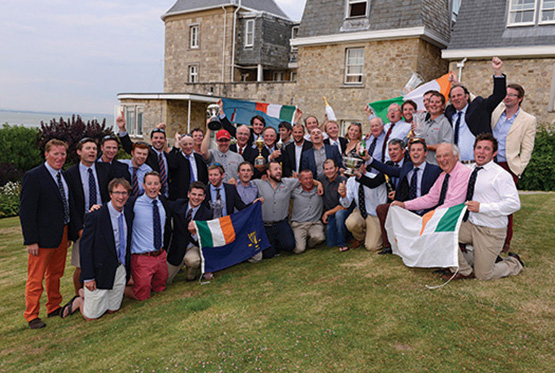
The big day – the Irish team park their tanks on the Royal Yacht Squadron lawn in Cowes after winning the Commodore’s Cup, July 2014
It all looked so easy once 2014’s win had been stitched up. But as the post-series review here on August 2nd 2014 revealed, the stresses and strains – particularly on Anthony O’Leary who did the heavy lifting in putting the team together and keeping the show on the road – were beyond most people’s imagining.
With hindsight now, it is easy to say that it was somewhere back towards Easter this year that the writing on the wall began to appear about how Ireland was going to have to opt out of the 2016 series. The new wave of Fast40+ boats on the Solent in the RORC Easter Challenge had been giving the already senior Antix a very hard time. If Anthony O’Leary and his crew were going to give of their best in campaigning their own boat in what is rapidly emerging as the hottest class in Europe, then they didn’t really need the distraction of rustling up a Commodore’s Cup team to add to their struggles.
For sure, back in 2014 the Commodore’s Cup was top billing. But the remorseless growth of the Fast 40s is making them the top show in town for 2016. They’d seven or eight of them in serious contention last year. At Easter, it was 10 and 11 boats, many of them barely out of the wrapping. In two weeks time, when they have their next major three day event on the Solent from May 20th to 22nd, we will be looking at a dozen and more boats so hot you could fry an egg on them.
Numbers like this, at this level of competition, inevitably attract the heavy hitters among owners and top professional sailors, providing a challenge which you either take head on, or opt out of altogether. For the amateur crew of Antix, it’s a case of take it or leave it. In taking it with full commitment to Fast40+ racing, they simply have to accept that they can’t overload themselves by the extra effort of running Commodore’s Cup involvement, though perhaps they could contemplate being in an Irish squad if by some miracle the perfect team package is put completely and exactly in place by some sort of offshore racing fairy godmother.
But you don’t get fairy godmothers in the rough tough world of offshore racing. The perfect dream package isn’t there, and it won’t be. So Antix and her crew of dedicated amateurs are going to be in the David and Goliath situation of throwing themselves totally into the fray of the Fast 40s, and we can only hope that the original David and Goliath scenario is replicated, for this is definitely the big boys’ game.
And yet, and yet……there’s no such thing as an inevitable outcome. Who knows what might emerge from the first proper gladiatorial confrontation of the Fast 40s in their newly confident expanded numbers? We may be saying this morning that an Irish defence is over and out. But surely it’s not beyond the realms of possibility that in the heady post-regatta atmosphere at the RORC’s Cowes base in a fortnight’s time, somebody might say: Why don’t we as a crew take a boat and join up with Antix and the new JPK 10.80 to race for Ireland?
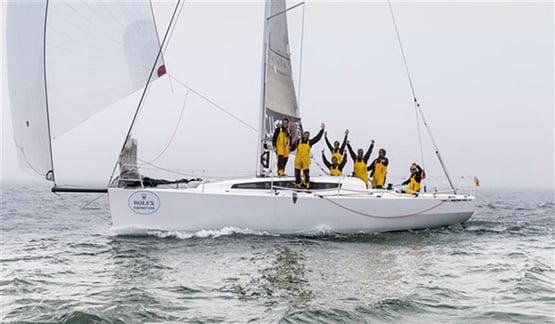
The JPK 10.80 Courier du Leon wins the 2015 Rolex Fastnet Race
Stranger things have happened in putting Commodore’s Cup teams together in the past. In 2014, so speculative was the buildup that Anthony O’Leary admitted afterwards that until the American Ker 40 Catapult was actually unloaded from a Transatlantic ship on European soil, he wasn’t a hundred per cent convinced she was going to appear at all.
Yet ironically, there was Catapult on the quay as hoped for, after various dockside and clubhouse meetings and negotiations in Key West way back in January. But the whereabouts of the team’s third boat Quokka 8, which had been chartered by Michael Boyd and Niall Dowling, was now a matter for concern.
She’d been campaigning in the Caribbean through the winter, but had been scheduled to be shipped back in plenty of time for the start of the new RORC offshore season. But the ship she was aboard was re-routed, then re-routed again. She arrived back this side of the Atlantic barely in time for the team’s first get-together at Volvo Cork Week in July 2014. But then it all became sweetest fantasy, as Quokka won Volvo Cork Week overall, following which the Irish team won the Commodore’s Cup going away.
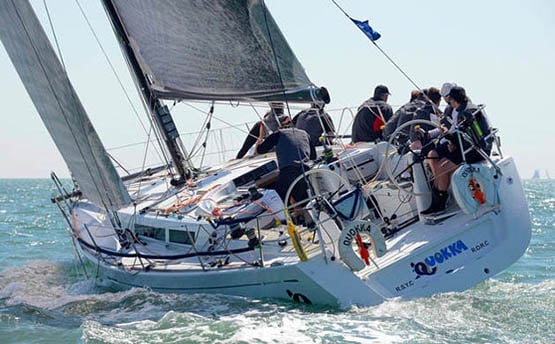
Quokka 8, overall winner of Volvo Cork Week 2014
So who knows what might just somehow develop. But meanwhile the critics are sharpening their knives, and there’s much muttering about it being disgraceful that Ireland doesn’t look like defending a trophy we were so pleased to win just two short years ago.
Thus a suggestion is floating around that ICRA should be prepared to allow just about any old team to go and join the scrap for the Commodore’s Cup 2016. Why not, they suggest, just allow three J/109s to go along to represent the Ould Sod, and give their crews a real taste of sailing at the sharp end?
Certainly the Commodore’s Cup as a Sail Training event has a distinct Quixotic appeal. But underneath the whole story is the reality that while in places like the Solent the top end of high-profile sailing is invariably dominated by professionals, within and around Ireland we don’t really do professional competitive sailing at all.
We’re compulsive and obsessive amateurs, and that’s the way we like it. If our sailing isn’t fitted in to cherished little slivers of free time carved out of the day job, then we don’t really think it’s genuine sport at all. Thus while it’s fine and dandy every so often to take on the Solent heavies and maybe just occasionally show them the way, we’d just as soon save our limited holiday time for a proper tilt at the West Cork Regattas or events like the ICRA Nationals, where we’re racing against people we know, and not shelling out money for exorbitant Cowes rentals. Like it or not, that’s the way we are.
Meanwhile, it’s rumoured that the 2018 Commodore’s Cup will be based of teams of just two boats each. Now they tell us…….But that’s not teams. That’s multiple doubles matches.
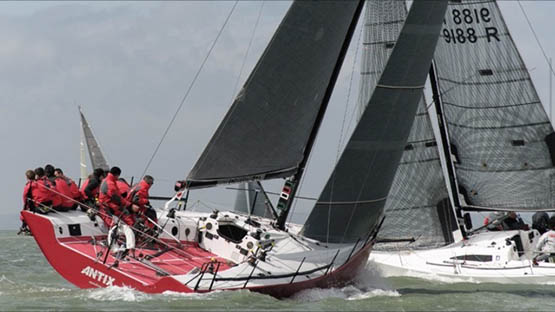
A demanding animal to sail. The tiller-steered Ker 40 Antix is not for the faint-hearted
Read also: ICRA Statement on 2016 Irish Commodore's Cup team
After a stunning performance over the Bank Holiday weekend, local Le Havre boat Pintia is the overall winner of the 2016 RORC Cervantes Trophy Race. The French J/133, racing in IRC Two, was skippered by Gilles Fournier and crewed by the creator of the Louis Vuitton Cup, Bruno Trouble and past Commodore of the Société des Régates du Havre, Corraine Migraine. Pintia's big win was set up right from the start when the French team chose the north shore of the Solent and led overall into the English Channel. Squally conditions prevailed south of the Isle of Wight with several yachts damaging sails in the 30 knot gusts, accounting for the retirement of last year's class winner, Harry Heijst's Winsome and Brian Wilkinson's Rigit On Wild Child. Lighter conditions prevailed for the majority of the fleet as they crossed the English Channel but Pintia managed to stay in good breeze to claim overall victory. Pintia was second overall last year and Gilles Fournier was delighted with the win.
"Corraine Migraine is my daughter and Bruno Trouble is my very old friend, we sailed 505s in the 60's, Quarter Tonners in the 70s and Admiral's Cups in the 80s, so we have a good understanding in the team. At the start, we had the current with us and although we had to sail more miles, we were first overall at No Man's Land Fort, to the south the current was against the boats that went that way, so that was very good for us, very valuable. When we left the Solent we did not have much wind, which was expected but then the wind picked up again after Bembridge Ledge and we tacked very close to the shore up to St. Catherine's Point. We had a big squall and tacked at the right moment. For the Channel crossing and finish at Le Havre, we managed to stay in 10 knots of wind all the way, while the wind died behind us. We will be celebrating in the yacht club today, we are very happy to win in our home port."
IMOCA 60, Artemis Ocean Racing, skippered by Mikey Ferguson, took line honours and the class win in IRC Canting Keel. Mikey Ferguson's team are all talented young sailors with high aspirations for the future; Irish Figaro sailor Dave Kenefick, British Two Handed Sevenstar Round Britain and Ireland sailor Conrad Manning, American Mini-Transat sailor Jesse Naimark-rowse and Abu Dhabi Ocean Racing Volvo Ocean Race rookie, James O'Mahony.
"We are looking to compete in the majority of the RORC programme and during the season we will bring in some of the Artemis Academy sailors, this year we also have Dee Caffari sailing with us as coach for the young Brits who are aiming to comepte in the 2020 Vendee Globe. We are out to retain our trophies from last year. We have a very young crew but also a very experienced team and after two individual wins and two second overalls last year, we would like to win a race outright!"
In IRC One, James Neville's HH42, Ino XXX was the winner and placed second overall. The British team's performance will be noted by the RYA Selection panel, as the Cervantes Trophy Race is a qualifier for the Brewin Dolphin Commodores' Cup, a main objective for 2016 for Ino XXX. Nicholas Jones' First 47.7, Lisa, co-skippered by RORC Commodore, Michael Boyd was second in class and third overall. Alan Hannon's RP45, Katsu was third in class and fourth overall.
In IRC Two, Pintia was the class winner, in second place was Maxime de Mareuil's X-41, Orange Mecanix and third was Sailing Logic's First 40, Rocket Dog II, skippered by Richard Oswald.
In IRC Three, Arnaud Delamare and Eric Mordret's JPK 10.80, Dream Pearls was the class winner. Dream Pearls home port is St.Malo and the team have been racing together for about 12 years with tremendous success including second overall in the 2015 Rolex Fastnet Race. "We are coming back this year with the same spirit, to enjoy good sailing and we have the philosophy of " GO hard or GO home"!!! We are very fond of RORC races, which are full of nice and well suited boats, with good competitors and a nice organization. Our first objective this year will be the European IRC championship taking place at Cork this July. We will do our best for a good result in the RORC Season's Points Championship. It will be very tough with so many dangerous competitors... we love that!"
In IRC Three, second and third were both Two Handed teams. Jean-Eudes Renier's JPK 10.80, Shaitan was second in IRC Three but first in the IRC Two Handed Class. Shaitan had a terrific battle with the reigning Two-Handed champion, Louis-Marie Dussere's JPK 10.10, Raging Bee. Shaitan won the Two Handed class by just one minute and 37 seconds after 28 hours of racing. British pair, Ian Hoddle & Nigel Colley racing Sunfast 3600, Game On was third in IRC Two-Handed.
In IRC Four Noel Racine's JPK 10.10, Foggy Dew went one better than last year, winning the class. Noel was relieved to have scraped into Le Havre just before the tide really started to build and the wind shut down; leaving the rest of IRC 4 struggling to make any progress towards the finishing line.
In the Class40 division, Christophe Coatnoan's Partouche was the winner, ahead of Tony Lawson's all girls team racing Concise 2, skippered by Joy Fitzgerald.
The RORC Season's Points Championship continues with the North Sea Race, which is weighted at 1.2 for the championship. The North Sea Race is scheduled to start on Friday May 6th from Harwich bound for Scheveningen, approximate race length is 180 nautical miles across the North Sea.
RORC Fleet Set for English Channel Race
The Cervantes Trophy Race is traditionally the first English Channel Race of the Royal Ocean Racing Club's Season's Points Championship and this year’s race from Cowes to Le Havre has attracted a variety of yachts from Belgium, Britain, France, Germany and the Netherlands. The majority of the teams are passionate Corinthians, but make no mistake, the RORC Season's Points Championship is arguably the toughest offshore series of races in the world. Each race has its own worthy prize, both for overall and class, after time correction using the IRC rule. The Season’s Points Championship Class winners are decided by the best five results across the Season.
James Neville from Cambridge, UK will be racing his HH42, Ino XXX in IRC One for the Ceravntes Trophy Race. “The Cervantes Trophy Race is a qualifier for the Brewin Dolphin Commodores' Cup and we hope to get a step further to being selected by performing well. It is going to be a cold one but we are an experienced crew coming together on a new yacht and we are targeting several offshore races and the IRC National Championship to sharpen up for the Brewin Dolphin Commodores' Cup and we aspire to upgrade to a Fast40+ next season.”
Surgeon Adrian Lower, from Burnham on Crouch, will be racing his Swan 48, Snatch, with co-owner David Smith in IRC Two. “We are a bunch of Essex adventurers and have entered the race because our aim is to do as many RORC races as we can before we head south for the Swan Worlds in Sardinia. The highlight of the programme for us will be the Transatlantic Race and the RORC Caribbean 600 in February 2017. This November will be my second Atlantic crossing and I am hoping to do it short handed this time.”
Jean-Eudes Renier is originally from France but works in London in the Financial sector, he has been sailing since he was a child and has competed in several Rolex Fastnet Races. Jean-Eudes will be competing in the Cervantes Trophy Race in the IRC Three and the Two-handed Class, which has seven teams entered.
“The boat is a new JPK 10.80 called Shaitan (little devil in Arabic). I race her double handed and we aim at competing for the Two-handed RORC championship for 2016 with my friend Patrick Baune. We have been doing fully crewed RORC races since 2004 on various boats that we owned and are now trying our hand at double handed which is extremely exciting. The Cervantes is the first race of the season in our programme. If you know of crew who could help me sail the boat back from Le Havre to Lymington after the race I would be delighted!”
Brian Wilkinson from Crowthorne, Berkshire will be racing Corby 30, Wild Child in IRC Four. Formerly called Yes! the yacht is probably the most successful boat designed by Cowes boat designer John Corby. Brian Wilkinson was a class winner for small multihulls in the 2006 Two-Handed Round Britain race.
“We've entered the Brewin Commodores' Cup selection trials, this race is part of the qualification requirement and great training for the Cup’s offshore race. The new format and rating bands for the Cup mean that after adding a larger overlapping jib and spinnaker, Wild Child re-rated higher to meet eligibility criteria. The new sails have significantly boosted our speed in light to medium airs and I think we could be a contender for the GBR team small boat slot. Wild Child has been very successful inshore, it's going to be interesting to see how she'll go offshore. The crew are a bit of a mixture, some members have sailed in previous GBR Commodore Cup teams, and have extensive offshore experience with multiple Fastnet race campaigns and a range of boats from offshore multihulls to Mumm30s. There are ex-dinghy sailors stepping up to offshore racing for the first time too in our trim and foredeck team. The crew was found using a wide selection of club web sites and Facebook groups. For us the focus is on Commodores Cup qualification so we hope to do well in one other offshore race the De Guingand Bowl and then focus on inshore racing for the Cup .”



























